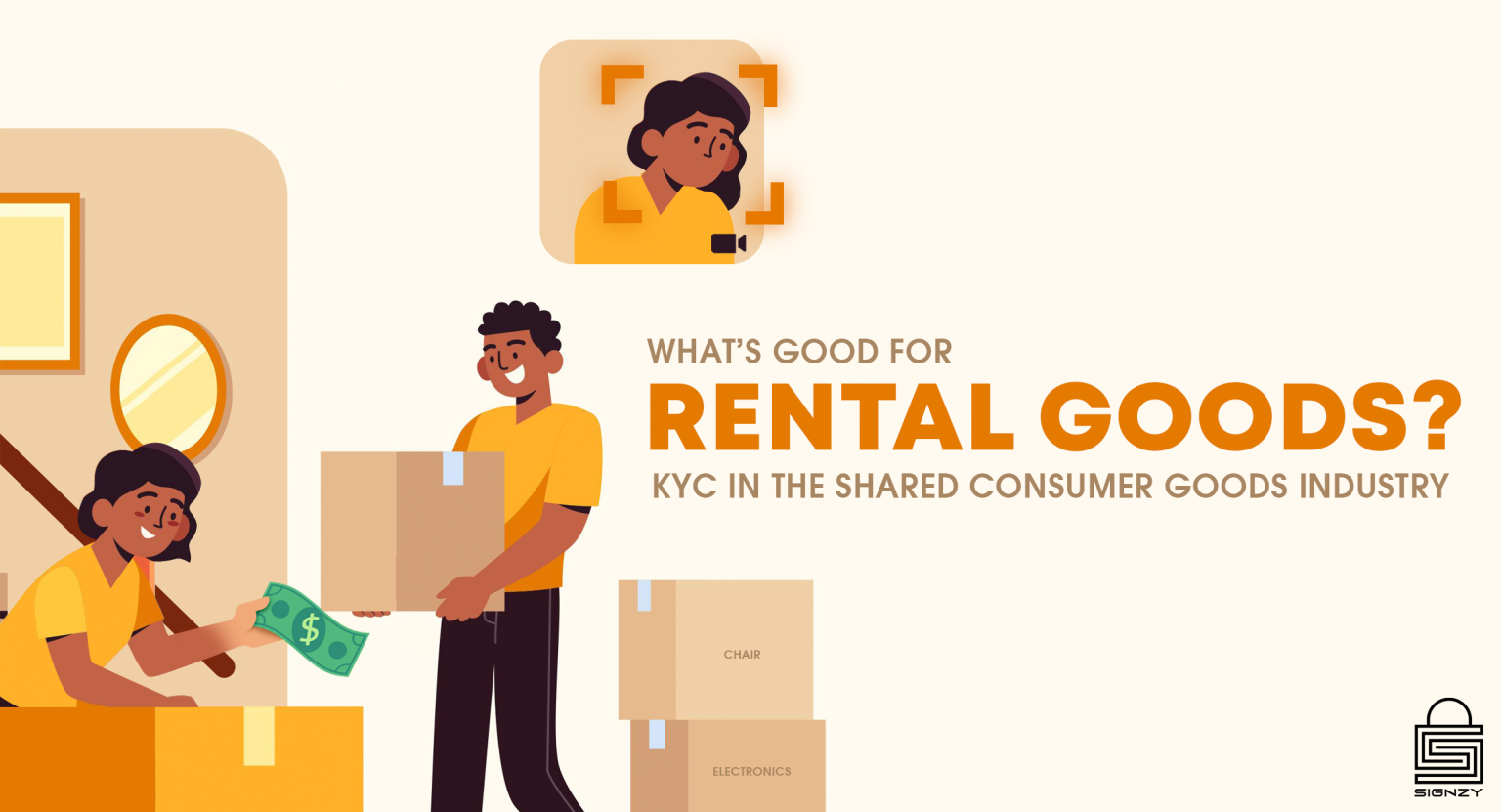KYC in the Shared Consumer Goods Industry
Shared Consumer Goods represent a shift in modern consumption patterns, emphasizing accessibility over ownership. As the global community becomes more environmentally conscious and urban spaces more constrained, the idea of owning every product outright becomes less feasible and less attractive.
In 2019, the rental industry has made a huge market in India with estimates that the market stands at about $1.5 billion. But most people tend to limit the rental industry to car/house rentals like Zoomcar or ZoloStay. But in reality, the rental industry consists of almost every kind of consumer product that one could imagine.
When you need a new king-sized bed but can’t afford a new one, RentoMojo or Furlenco offers you premium quality beds and furniture for rent.
Attending a social affair but can’t afford the right attire?
Login to thestyledoor.com and rent trending fashionable clothing at almost a tenth of the purchase price.
Then there are other major brands like Quikr, GrabOnRent, and RentSher which provide you a wide range of goods on rent. You can find everything from home appliances to electronics to gym equipment on rent here. So basically, the policy of rental companies is something like: If you can dream it, you can rent it !!!!
Rise Of Rental Consumer Goods – How It Came About
Technology has redefined the concepts of sharing and renting, as Netflix has done with videos, Uber with transportation, and Airbnb in hospitality.
A sizable sharing economy is opening up on apps and mobile sites that allow users to pick up a mind-boggling array of stuff on rent—designerwear, sofas, refrigerators and microwaves, beanbags, flat-screen TVs, and much more. The business is tantalizingly attractive and expected to scale to $45-48 billion, from less than a third of that, according to reports by industry lobby Assocham and consultancy firm Ernst & Young.
Millennials!!
The majority of consumers consists of the youth who are just out of college and into their first jobs — are driving the sharing economy. Renting for them makes more economic sense than buying.
How Rental Products Work – The Major Players & Their Initiatives
The sharing economy is expanding from cab rides, houses, movies to furniture, appliances, and more. The leasing economy solves the problem of need today.
- Furlenco claims to have furnished more than 20,000 homes in the past two years. It has an ambitious goal to scale ten-fold by 2020, entering two lakh homes. Earlier, furniture was owned rather than rented as there was no option. Now, bachelors, who average 28 years of age and constitute 60% of Furlenco’s customers, have the choice of renting furniture via apps. Even newly-married couples, with a joint income of Rs 10 lakh a year, opt to rent furniture, which forms 80% of Furlenco’s business appliances account for the rest.
- Another rising star in this sector is GrabOnRent – which offers a marketplace for renting projectors, lights, adventure gear, bikes, microwaves, refrigerators, and other appliances, GrabOnRent started in 2015. GrabOnRent claims to have 9,000 users who have leased out 15,000 products. To source products, GrabOnRent has 450 partners, including Godrej Appliances and Micromax. It offers free delivery and pick-up once the rental period is over and takes care of maintenance such as aircon servicing during the duration of the lease. To rent a washing machine costs Rs 649 a month, a refrigerator, Rs 649 per month and a TV, Rs 899.
- In an overcrowded online fashion space, Stage3.co is trying to carve out a niche by renting. It is avoiding fast fashion to focus on designerwear and leveraging linkages with Bollywood stars and fashion designers to offer exclusive collections on lease for both men and women.Stage3 has a team of 30 in-house designers and also sources unused capacity from others. The bulk of the orders come from Mumbai and Delhi, with 60% of them being repeated. Designer outfit rentals can range between Rs 20,000 to Rs 3,000 for a night.
- Currently serving 8 cities, Rentomojo offers rentals for furniture, motorbikes, and electronics. The website is regularly updated with new products and though the selection is limited, there are a lot of details available for each product to make an informed decision. Personal gadgets (phones, laptops) can be rented for up to 18 months while other electronic products, motorbikes, and furniture can be rented for up to 36 months. They also offer a ‘rent-to-own option — if you’ve been renting something for 12 months, you can buy and keep the product by paying the balance. Note that home appliances and furniture have to be rented for a minimum of 3 months.
- Available in 5 cities, Rentickle offers rentals of DSLR cameras, home appliances, and furniture. Like Rentomojo, this one also offers a rental period of up to 36 months for home appliances and furniture. However, DSLRs can be rented for a maximum of 7 days only. The website supports user reviews — you can see reviews for each product before renting. The minimum rental period of home appliances and furniture is 1 month. Another useful feature of the service is that they offer the option of one free relocation of the item during the rental period.
India is being considered the fastest-growing consumer market in Asia. On a rough estimate based on multiple sources, the market for rental of furniture is seen at around $800-850 million. Rentals of electronic appliances are approximately a market of $500 million while that of bikes is $300 million.
But a growing market means the rental companies will have an increase in clientele. Like most internet-based companies, the rental companies also follow the same approach where the owner never meets the buyer. So in order to authenticate users, KYC collection and verification are a must. But traditional forms of KYC collection can be cumbersome and require a lot of manpower, time, and infrastructure.
With the advent of digital KYC, it is much easier to automate the KYC collection process. We at Signzy offerRealKYC. Using an AI-based approach, RealKYC not only allows users to upload their KYC information online but the system uses a host of microservices to verify the authenticity of the user and information uploaded.
The rental consumer goods economy has a huge scope in the upcoming years as the majority of the country belongs to the middle-income group with a high propensity to consume. With the public becoming more and more accustomed to internet-based products and services, the digitization of rental services has a promising future indeed.
E-KYC and VideoKYC – The New Era
Most rental companies operate via the Internet and the business model is set up in such a way that the tenant never has to meet the seller. Other than security issues, knowing the customer is important as most users pay online for their rentals. Rental/shared economy operates on a large customer base. To maintain customer data, KYC collection and verification are required.
With the new government regulations, e-KYC collection is now an easy option for rental companies. At Signzy, we offer a unique e-KYC solution known as RealKYC. The solution offers KYC collection as well as background verification and checks.
Advantages of RealKYC:
- Secure System: A customer’s account information is secure because the entire process is online. Identity theft, fraud, loan scams, money laundering, the flow of black money, etc. are all minimized with RealKYC.
- Efficient Communication: Effective information can be relayed in an efficient and timely manner. There is no need for constant back and forth. Most details are published automatically unlike manual KYC.
- ‘Free of Cost’ Process: RealKYC verification doesn’t charge any extra amount to the customer. A company or institution may need to pay automation costs of installing verification systems for the long run.
- Faster processing: The RealKYC service is completely automated online. This means that KYC data can be transferred in real-time without the need for any manual intervention. The paper-based KYC process can take days up to weeks to get verified, but the eKYC process takes just a few minutes to verify and issue.
At Signzy, We have also introduced a new form of KYC verification called VideoKYC. This is a faster and more efficient form of KYC collection and verification. It conducts liveliness checks against the user as well as verifies the identification document against forgeries. The VideoKYC product has gained a lot of recognition and won several awards in recent months.
Advantages of using VideoKYC:
- Higher Application Accuracy
- Plug and Play solution, swift Go-To-Market
- Comprehensive Training Program
- Competitive Advantage through customer delight
- 100% compliant with latest RBI Mandate
- Exponentially increase Scale of Operations
- Reduced back office overheads (up to 70%)
- Reduction in customer Drop-offs (up to 50%)
- Platform Agnostic, support multiple communication channels
Conclusion
With the rapidly advancing technology, the terrain in the rental economy is changing. If companies in the sector decide to adapt to this and use the newer methods for processing and KYC, it will boost their efficiency.
Long-term reduction in costs and the increased pace of processing will attract more customers. This is primarily due to the easier KYC methods we can implement with the use of VideoKYC and other means. Thus, it is only sensible to use technology in taking hold of the future of the rental and shared economy in consumer goods.
About Signzy
Signzy is a market-leading platform redefining the speed, accuracy, and experience of how financial institutions are onboarding customers and businesses – using the digital medium. The company’s award-winning no-code GO platform delivers seamless, end-to-end, and multi-channel onboarding journeys while offering customizable workflows. In addition, it gives these players access to an aggregated marketplace of 240+ bespoke APIs that can be easily added to any workflow with simple widgets.
Signzy is enabling ten million+ end customer and business onboarding every month at a success rate of 99% while reducing the speed to market from 6 months to 3-4 weeks. It works with over 240+ FIs globally, including the 4 largest banks in India, a Top 3 acquiring Bank in the US, and has a robust global partnership with Mastercard and Microsoft. The company’s product team is based out of Bengaluru and has a strong presence in Mumbai, New York, and Dubai.
Visit www.signzy.com for more information about us.
You can reach out to our team at reachout@signzy.com
Written By:

Signzy
Written by an insightful Signzian intent on learning and sharing knowledge.



